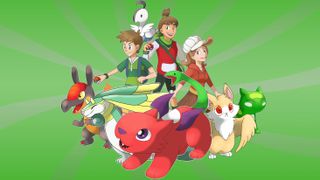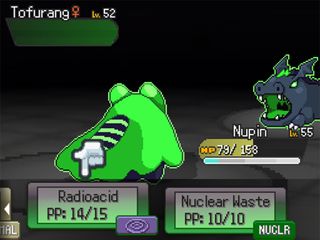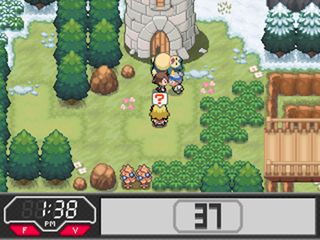How Pokémon Uranium and a community of amateur developers is walking the line between love and theft
What happens when you adore something so much you can't help but steal from it?

According to the Chinese zodiac, it’s the Year of the Monkey. But in truth it's the Year of Pikachu. The release of Pokémon GO has created a fever not seen since the '90s when kids first shambled around playgrounds trading and capturing Pokémon. It's a fever so intense that even those who choose to play on PC can't escape the need to catch 'em all. For most of us, that Poké-mania is either an excuse to go outside and stare at a phone or an excuse to tease the people who do, but for two fans-turned-developers and the community they're a part of, it's placing their years of hard work precariously close to the edge of legal oblivion.
"It was just a perfect storm of everything that people wanted exactly when they wanted it," a woman who goes by the handle 'Involuntary Twitch' tells me. She sounds just a bit tired. I would be too if I'd unexpectedly spent the last few weeks mothering an enthusiastic community numbering in the tens of thousands.
Two weeks ago, Involuntary Twitch and her friend 'JV' released Pokémon Uranium, their fan-made take on a traditional Pokémon game. For nine years they had been working on it as a pet project, attracting a humble audience of hundreds who loved the idea of playing a Pokémon knock-off on PC. But in a post-Pokémon GO world, Uranium wasn't niche, it was the answer to a massive demand for more of Pokémon. With Pokémon Sun and Moon not due until November, Uranium became the Pokémon game of choice. Within weeks, it had tallied up over 1.5 million downloads.
"It's a little bit stressful," Involuntary Twitch tells me over Skype. She explains that that on top of her day job she's been spending over three hours every evening dealing with the aftermath of the launch. "With the massive explosion of popularity, we've had to deal with our sites going down. We've had this massive influx of people and to try and control these communities, to try to respond to everyone's feedback and questions, it's just a lot of work. It's really like a second job."
That stress isn't only from the unexpected success of Uranium, but also from the controversy that soon followed. On August 13, Nintendo issued DMCA takedown notices to multiple sources where Uranium could be downloaded. Team Uranium, composed of just Involuntary Twitch and JV, the game's programmer, took down the links on their own website to “respect [Nintendo’s] wishes.” This effectively stopped it from being downloaded anywhere but on torrent sites, but the waves caused by the takedown have far from settled. In a week, Pokémon Uranium went from a game few people knew existed to one of the bigger games of the summer.
We didn't plan for our game to come out after Pokémon GO when Pokémon was at its peak of popularity.
We’ve already written about how fan games create an awkward catch-22 for both the fan-developers and the intellectual property owners like Nintendo. But the conflicts these fan-games create have deep roots in a niche community of amateur developers passionate about using Pokémon to tell their own stories. When countless indie games release every day on Steam, and when making and selling an original game has never been easier, why borrow someone else’s intellectual property and risk drawing the ire of a massive corporation with the means to sue you into the ground? For Involuntary Twitch, that answer is simple.
"I really wanted to make a Pokémon game."
PC Gamer Newsletter
Sign up to get the best content of the week, and great gaming deals, as picked by the editors.

Gotta hack ‘em all
Pokémon Uranium might be the one fan game on everyone's lips, but it's only a small portion of a much larger Pokémon community. Right now, there are at least a dozen fan games being developed by people just like Involuntary Twitch and JV—each one with its own unique spin on the Pokémon universe. Pokémon Phoenix Rising, for example, incorporates a much more involved storyline with branching quests.
Many of these projects owe their existence to the early Pokémon forum boards of the '90s. When the animated series and subsequent Game Boy games kicked off the first golden age of Pokémon, it captured the imagination of an entire generation. The premise of one day leaving behind the comforts of home to explore a world full of magical creatures wasn't just captivating, it was inspiring.
"There's some kind of universal element to every kind of Pokémon game that's all about making your own stories," Involuntary Twitch says. "Every time you have a Pokémon adventure, it's totally different from every other time you play a game. The Pokémon you catch, the battles you fight, it always feel unique. That feeling of crafting your own narrative is something that fans of Pokémon carry with them outside of the games into their communities."
For most, that meant roleplaying new adventures on forums or posting original fan art and custom Pokémon designs. When emulation made it possible to play Pokémon games on PC, it didn't take long before fans began hacking those roms, reassembling and modifying the bits and pieces to build their own version of a Pokémon game. Over the years, hundreds of these hacked roms circulated the internet—each one a unique perspective on what its creator loved about Pokémon. That's where Gavin Marshall, the game director on Pokémon Phoenix Rising, first began experimenting with building his own Pokémon game. "We came together in the sense that we love playing Pokémon games and we all want to put our stamp on what we'd want to see in the main series," he says.

But hacked roms have serious limitations and are akin to trying to write a novel by reorganizing the pages of an already existing one. In 2007, a programmer by the username of 'Poccil' created a scriptbase for the lightweight game engine RPG Maker XP called Pokémon Essentials. With this software, even those without an advanced knowledge of programming could build their own version of Pokémon.
Looking at the likes of Phoenix Rising or Uranium, it's hard to imagine that such ambitious games came from the idle tinkering of teenagers, but it's a common theme among many of the fan game developers I spoke with. But, almost miraculously, a few of those projects survived to near-completion. Marshall's Phoenix Rising has been in development for seven years and is slated to release its first episode later this year.
But in light of the DMCA takedowns of Pokémon Uranium, and when years of your blood, sweat, and tears are on the line, why risk making a Pokémon game at all?
"I don't think of it as borrowing Nintendo's [intellectual property]," Involuntary Twitch says. "I think we're working within an established universe because it's that universe that's inspiring to us. From a very young age, all of us have loved Pokémon. We're not interested in branching out, sawing off the serial codes, and making our own copy of Pokémon. We want to work within the Pokémon universe and make this tribute to a series that has really captivated our imaginations."
On the next page: How Pokémon fan games blur the line between fan fiction and competition.
With over 7 years of experience with in-depth feature reporting, Steven's mission is to chronicle the fascinating ways that games intersect our lives. Whether it's colossal in-game wars in an MMO, or long-haul truckers who turn to games to protect them from the loneliness of the open road, Steven tries to unearth PC gaming's greatest untold stories. His love of PC gaming started extremely early. Without money to spend, he spent an entire day watching the progress bar on a 25mb download of the Heroes of Might and Magic 2 demo that he then played for at least a hundred hours. It was a good demo.

Final Fantasy 14 is bringing its Yo-kai Watch crossover back after 4 years, offering weapon glams, mounts, and a minion we crowned 'the ugliest MMO pet of all time'

Final Fantasy 14: Dawntrail's new benchmark will get a 2.0 version after player upset over lifeless eyes, flattened faces, and cursed lalafell dolphin teeth
Most Popular



